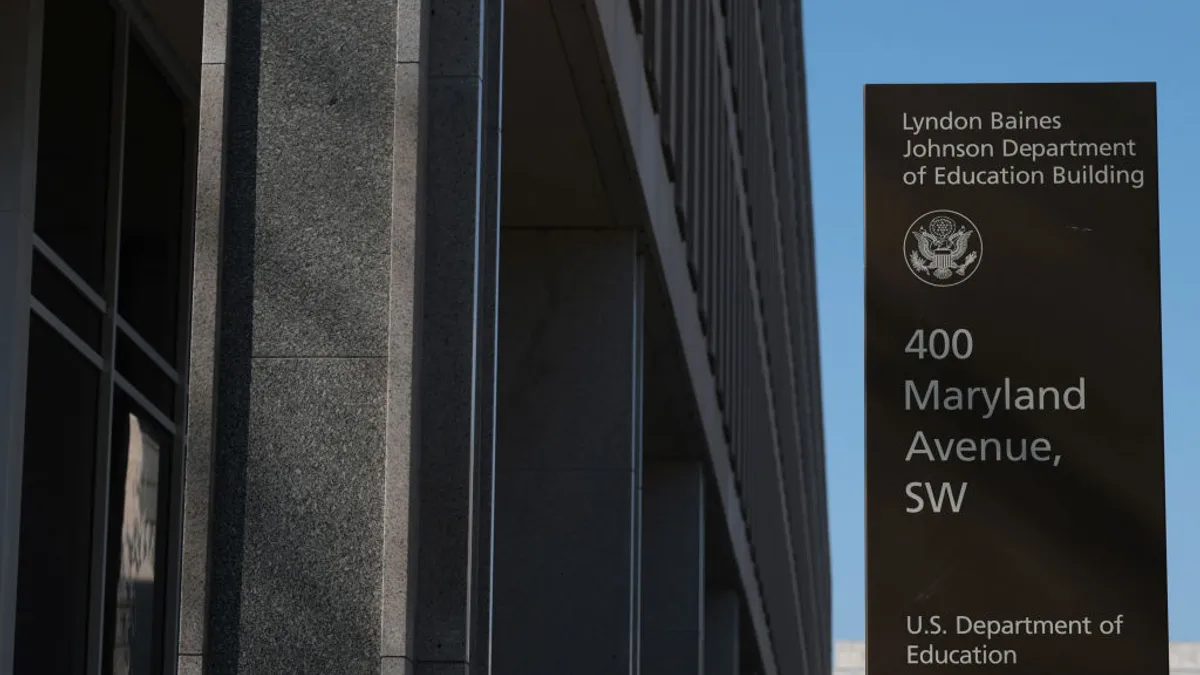Dive Brief:
- The U.S. Department of Education plans to propose regulations for “streamlining” the process for pulling federal funding from the colleges it determines have violated civil rights law.
- The notice of the forthcoming proposal was published in the Trump administration’s Spring 2025 Unified Agenda, which provides a glimpse of the federal government’s regulatory priorities and schedule for releasing new rules.
- The new proposal — which could be released this month — is intended to simplify the process for the Education Department’s Office for Civil Rights to seek “termination of Federal financial assistance to institutions that intentionally violate Federal civil rights laws and refuse to voluntarily come into compliance,” the notice says.
Dive Insight:
Under the Trump administration, the Education Department and other agencies have opened a flurry of civil rights investigations into colleges and K-12 schools. Some have targeted their diversity efforts and policies that allow transgender students to play on teams and use bathrooms aligning with their gender identities. Others have accused colleges of failing to address antisemitism.
Amid these investigations, the Trump administration has pressured colleges to strike deals with the federal government by freezing or pulling vast sums of federal research funding.
The University of Pennsylvania, for instance, resolved an Education Department investigation in July by agreeing to bar transgender women from competing on women’s sports teams. Penn also agreed to give Division I titles and records to cisgender women who had lost against Lia Thomas, a transgender woman who last competed on the university’s swim team in 2022.
The deal came after the Trump administration had pulled $175 million in federal contracts from Penn. Similarly, Columbia University and Brown University — which were both accused of failing to address campus antisemitism — have paid lofty sums to settle the administration’s allegations after the federal government froze hundreds of millions of dollars of their research grants.
The notice in the Unified Agenda says the Education Department plans to align civil rights enforcement procedures better with statutory requirements. The agency’s new regulations would pertain to enforcement of Title IX and Title VI. Title IX bars discrimination based on sex, while Title VI prohibits discrimination based on race, color or national origin.
The department did not immediately respond to a request for comment Friday.
Not every college targeted by the administration has been pressured into striking a deal.
The Trump administration froze $2.2 billion from Harvard University after the Ivy League institution refused to yield to demands to make sweeping changes to its admissions, hiring and campus policies. Harvard took the administration to court over the frozen funds, with a federal judge ruling in the university’s favor this week.
The Trump administration had said it was pulling the funding because the university had not done enough to address antisemitism on campus. Yet the judge overseeing the case said the evidence does not “reflect that fighting antisemitism was Defendants’ true aim in acting against Harvard.”
The Unified Agenda also provides a look at the agency’s other regulatory priorities, with changes coming down the pike for rules governing accreditation, the Public Service Loan Forgiveness program, and colleges’ reporting requirements for foreign gifts and contracts.
The Education Department recently kicked off the process to craft regulations to implement the sweeping changes mandated by the massive domestic policy bill passed by Republicans this summer.
The legislation will phase out Grad PLUS loans, which allow graduate and professional students to borrow up to the cost of attendance. It also creates lifetime federal loan limits, with a cap of $100,000 for most graduate students and $200,000 for professional students. And it will consolidate a handful of federal loan repayment options into just two — one income-based repayment plan and one standard plan with fixed payments.
Additionally, the policy package threatens to cut off federal student loan eligibility to college programs that can’t prove they provide an earnings boost. Undergraduate programs, for example, must show that at least half of their graduates earn more than a typical high school student in their state.
The American Council on Education and over 40 other higher education groups have urged the Education Department to work with Congress to delay implementing these changes until July 1, 2027.
The Education Department is currently on track to issue the rules no earlier than March 2026 — and likely later than that given the complexity of the law, according to the letter. As a result, the regulations would “impose major changes to financial aid and student loan repayment for millions of students and borrowers only months before they take effect,” the organizations said.













